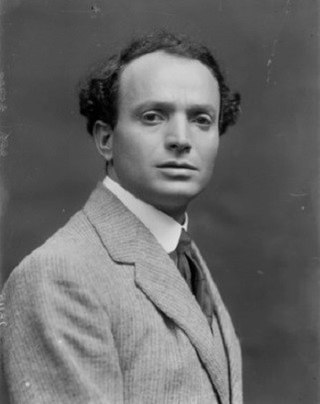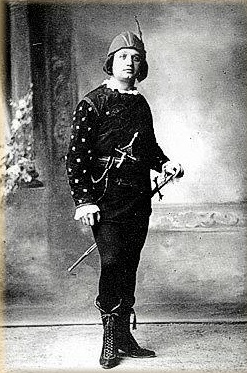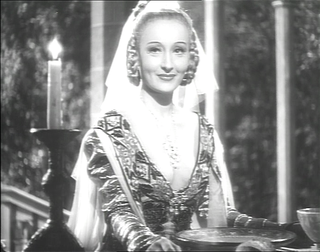
Umberto Menotti Maria Giordano was an Italian composer, mainly of operas. His best-known work in that genre was Andrea Chénier (1896).

L'amore dei tre re is an opera in three acts by Italo Montemezzi. Its Italian-language libretto was written by playwright Sem Benelli who based it on his play of the same title.

Mercedes Llopart was a Spanish soprano who later became a notable singing teacher in Italy.

I Medici is an opera in four acts composed by Ruggero Leoncavallo, with a libretto by the composer. Set in Renaissance Florence at the court of Lorenzo de' Medici, it was intended as the first part of a planned but unfinished trilogy called Crepusculum. The opera premiered on 6 November 1893 at the Teatro Dal Verme in Milan.

Carmen Melis was an Italian operatic soprano who had a major international career during the first four decades of the 20th century. She was known, above all, as a verismo soprano, and was one of the most interesting singing actresses of the early 20th century. She made her debut in Novara in 1905 and her career rapidly developed in her native country over the next four years. From 1909 to 1916 she performed with important opera companies in the United States; after which she was busy performing at many of Europe's most important opera houses. From 1917 until her retirement from the stage in 1935 she was particularly active at the Teatro Costanzi in Rome and at La Scala in Milan. After her singing career ended, she embarked on a second career as a voice teacher. Her most notable student was soprano Renata Tebaldi.

Joan Pons Álvarez is a Spanish operatic baritone, known internationally as Juan Pons. He is most famous for his Verdi roles.

Sem Benelli was an Italian playwright, essayist and librettist. He provided the texts for several noted Italian operas, including Italo Montemezzi's L'amore dei tre re and L'incantesimo, and Umberto Giordano's La cena delle beffe, based on Benelli's own play of the same title. He was a native of Prato. His dramatic play of La Gorgona was first staged in Trieste in 1913.

Siberia is an opera in three acts by Umberto Giordano from a libretto by Luigi Illica. It premiered on 19 December 1903 at La Scala in Milan. There is no direct source for the plot of Siberia and it is quite possible that this is an original work by Illica. It was suggested at the New York premiere in 1908 that it was based on Leo Tolstoy's 1899 novel Resurrection or one of the novels within it.

Lina Bruna Rasa was an Italian operatic dramatic soprano. She was particularly noted for her performances in the verismo repertoire and was a favourite of Pietro Mascagni who considered her the ideal Santuzza. Bruna Rasa created the roles of Atte in Mascagni's Nerone, Cecilia Sagredo in Franco Vittadini's La Sagredo and Saint Clare in Licinio Refice's 1926 oratorio, Trittico Francescano. She also sang the role of Tsaritsa Militrisa in the Italian premiere of Nikolai Rimsky-Korsakov's The Tale of Tsar Saltan.
Ernesto Badini was an Italian opera singer that sang in the baritone range. He was trained at Milan Conservatory and made his debut as Matteo at Lodi's Teatro Gaffurio in 1896. Badini was a regular performer at Milan's La Scala and achieved his greatest success in the comic role of Puccini's Gianni Schicchi.

Hipòlit Lázaro, better known as Hipólito Lázaro, was a Catalan-Spanish opera singer. He was active as an operatic tenor for four decades from 1910 through 1950.

Il re is a novella or opera in one act and three scenes by composer Umberto Giordano to an Italian libretto by Giovacchino Forzano. The opera premiered at La Scala in Milan on 12 January 1929.

Mese mariano is an opera in one act by Umberto Giordano. Its Italian libretto by Salvatore Di Giacomo was adapted from his play 'O Mese Mariano, which was in turn adapted from his novella, Senza vederlo. It premiered at the Teatro Massimo in Palermo on 17 March 1910. The opera is described as a bozzetto lirico and has a running time of 35 minutes. It tells the story of a woman who visits an orphanage to see her child. Racked with guilt at having abandoned him, she is unaware that he had died the night before.

Medea is an opera in three acts composed by Giovanni Pacini to a libretto by Benedetto Castiglia. It premiered on 28 November 1843 at the Teatro Carolino in Palermo, conducted by the composer with Geltrude Bortolotti in the title role. The libretto is based on the plays Medea by Euripides and Médée by Pierre Corneille.

Franco Lo Giudice was an Italian tenor who had a successful international opera career during the first half of the 20th century. He was an important exponent of the works of Riccardo Zandonai, notably starring in the world premieres of his operas I cavalieri di Ekebù (1925) and Giuliano (1928). His voice is preserved on a number of recordings made with the HMV, Parlophone, and Pathé record labels. Music critic Alan Blyth described him as a "fiery, strong tenor" who "excelled in verismo parts".

Teatro Grattacielo is a professional opera company based in New York City specializing in concert performances of rarely heard verismo operas. The company's past performances have included the North American premieres of Mascagni's Il piccolo Marat and Riccardo Zandonai's I cavalieri di Ekebù and La farsa amorosa. Its name means "Skyscraper Theatre" in Italian, a reference not only to the New York skyline but also to the Teatro Grattacielo in Genoa, a cinema which was the city's temporary opera house while the Teatro Carlo Felice was rebuilt after extensive damage in World War II.

Gloria is a tragic opera in three acts by Francesco Cilea with an Italian libretto by Arturo Colautti. A variation on the Romeo and Juliet story and set in 14th century Siena, the libretto is based on Victorien Sardou's 1874 play La Haine (Hatred). The opera premiered on 15 April 1907 at La Scala conducted by Arturo Toscanini with Solomiya Krushelnytska in the title role. Gloria was a failure at its premiere when it was withdrawn after two performances and fared little better in the 1932 revised version, although there have been two late 20th century revivals. It proved to be Cilea's last staged opera. In the 43 years following the premiere of Gloria he worked on two or three further operas which were never performed and continued to compose chamber and orchestral music.

The Jester's Supper is a 1942 Italian historical film directed by Alessandro Blasetti and starring Amedeo Nazzari, Osvaldo Valenti and Clara Calamai. It was based on a play of the same title by Sem Benelli, which had later been turned into an opera by Umberto Giordano. Like the play, the film is set in the 15th century Florence of Lorenzo the Magnificent and portrays a rivalry that leads to a series of increasingly violent practical jokes.

The Jester's Supper is a historical play by the Italian writer Sem Benelli, which was first staged in 1909.
Savino Monelli was an Italian tenor prominent in the opera houses of Italy from 1806 until 1830. Amongst the numerous roles he created in world premieres were Giannetto in Rossini's La gazza ladra, Enrico in Donizetti's L'ajo nell'imbarazzo and Nadir in Pacini's La schiava in Bagdad. He was born in Fermo where he initially studied music. After leaving the stage, he retired to Fermo and died there five years later at the age of 52.


















